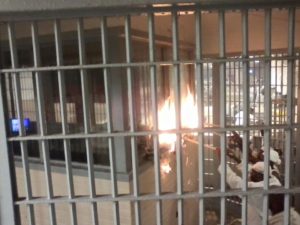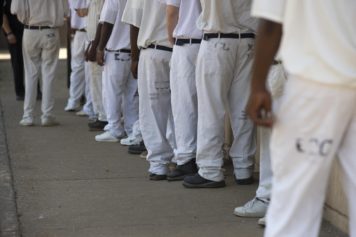
Holman prison, Alabama
Alabama is known for many things, but the humane treatment of prisoners is not one of them. This Southern state — where the legacy of slavery has bled into the present-day reality of the new Jim Crow-era warehousing of Black men — has witnessed a number of prison uprisings of late. Reminiscent of the Attica uprising in New York 45 years ago and other similar penal rebellions, when men are faced with inhumane and unbearable conditions, they revolt against the conditions under which they are subjected.
The context under which the Alabama prison system operates is one of severe overcrowding, as The New York Times reported. The state prison system houses 24,000 inmates, although it was designed for 13,318. Moreover, Alabama is one of the nation’s poorest states in the nation, and the state has only just begun to move away from the harsh sentencing that created the overcrowding issue in the first place. The crisis is a longstanding one that has plagued many wardens and governors.
“What we have today in Alabama makes it dangerous for not only the inmates, it makes it dangerous also for our guards and our wardens and anybody who is involved in this situation,” said Gov. Robert Bentley during his visit to the William C. Holman Correctional Facility, which witnessed recent incidents of violence.
“When there’s overcrowding in a facility, it leads to tremendous levels of tension between inmates, between inmates and staff, and it puts a strain on all of the resources of the facility,” Michele Deitch, a senior lecturer at the University of Texas and former court-appointed monitor for the Texas prison system, told The Times. “The combination of all of those things can very easily lead to violence.”
As Democracy Now! reported, on Monday, prisoners at Holman set fires and barricaded themselves in a dormitory, and a warden and guard were injured. The inmates at Holman released a set of demands after two recent uprisings, including releasing prisoners who have served excessive sentences, classes to help them reintegrate into society, and financial compensation for “mental pain and physical abuse.”
Meanwhile, on Wednesday, Gov. Bentley issued a statement on the passage of the Alabama Prison Transformation Initiative Act by the state Senate Finance and Taxation General Fund Committee, as Alabamanews.net reported.
“For decades, Alabama’s prisons have become increasingly overcrowded, dangerous to both inmates and our corrections officers and incredibly costly to taxpayers. I commend the Senate committee for passing the long needed Prison Transformation Initiative Act out of committee today,” the governor said.
“This bill will allow Alabama to take the next step toward constructing four new prisons, which will provide safer conditions for our corrections officers as well as inmates in facilities such as Tutwiler Prison for Women,” he added. “Alabama can and should be a national leader in safe and effective incarceration of inmates. I look forward to continuing a partnership with the members of the Legislature to make Alabama a truly great state.”
According to the Anniston Star, the measure, which passed through committee with a 15-1 vote, is an $800 million plan to close over a dozen prisons and build four larger prisons to replace them, including three, 4,000-bed men’s facilities and a women’s prison. When sexual abuse accusations at Tutwiler Prison for Women surfaced a few years ago, intense scrutiny was placed on Alabama’s prison problems, in which corrections institutions were packed at double their capacity. Today, due to sentencing reforms, the prison population has been reduced from 200 percent to 180 percent, which is an improvement but still extremely high. According to supporters of the plan, the $800 million bond issued to pay for the prison could be paid off with savings from closing other prisons. Meanwhile, critics have their doubts about the feasibility.
Interestingly, as the Cotton State attempts to wean itself off prison overcrowding, the solution they have developed involves the construction of more prisons and a continuation of mass incarceration in shiny, new dungeons. Someone will undoubtedly profit from these institutions, as is the case in America, the land of the imprisoned. Meanwhile, when people are caged and treated like animals, as is the case in Alabama’s prison, we should not be surprised if they lash out against their conditions.


